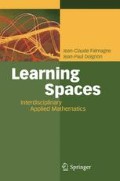Abstract
In the two preceding chapters, we have described assessment procedures for uncovering the knowledge state of a student in a scholarly topic. Such a knowledge state is one among possibly many states forming a knowledge structure for the topic. We now turn to the problem of building a knowledge structure in practice. In this chapter, we deal with the case of knowledge spaces, that is, union-closed knowledge structures. Methods for building learning spaces are considered in Chapter 16. They are based in part on the techniques of this chapter, which is sensible because learning spaces are particular knowledge spaces (cf. Theorem 2.2.4).
Access this chapter
Tax calculation will be finalised at checkout
Purchases are for personal use only
Preview
Unable to display preview. Download preview PDF.
Bibliography
J.-Cl. Falmagne. Finite markov learning models for knowledge structures. In G.H. Fischer and D. Laming, editors, Contributions to Mathematical Psychology, Psychometrics, and Methodology. Springer Verlag, New York, 1994.
F. Drasgow. Polychoric and polyserial correlation. In S. Kotz, N.L. Johnson, and C.B. Read, editors, Encyclopedia of Statistical Sciences, volume 7, pages 68–74. Wiley, New York, 1986.
E. Cosyn and N. Thiéry. A Practical Procedure to Build a Knowledge Structure. Journal of Mathematical Psychology, 44:383–407, 2000.
K.C. Arnold. Screen updating and and cursor movement optimization: a library package. In UNIX Programmer’s Supplementary Documents, volume 1. University of California, Computer Science Division, Berkeley, 1986.
M. Villano. Computerized knowledge assessment: Building the knowledge structure and calibrating the assessment routine. PhD thesis, New York University, New York, 1991. In Dissertation Abstracts International, vol. 552, p. 12B.
M. Koppen. Extracting human expertise for constructing knowledge spaces: An algorithm. Journal of Mathematical Psychology, 37:1–20, 1993.
C.E. Müller. A procedure for facilitating an expert’s judgments on a set of rules. In E.E. Roskam, editor, Mathematical Psychology in Progress, Recent Research in Psychology, pages 157–170. Springer-Verlag, Berlin, Heidelberg, and New York, 1989.
B. Harris. Tetrachoric Correlation Coefficient. In S. Kotz and N.L. Johnson, editors, Encyclopedia of Statistical Sciences, volume 9. John Wiley & Sons, London and New York, 1983. C.B. Read, associate editor.
C.E. Dowling. Integrating diérent knowledge spaces. In G.H. Fischer and D. Laming, editors, Contributions to Mathematical Psychology, Psychometrics, and Methodology, pages 149–158. Springer-Verlag, Berlin, Heidelberg, and New York, 1994.
G.M. Tallis. The maximum likelihood estimation of correlation for contingency tables. Biometrics, 9:342–353, 1962.
J. Heller. A formal framework for characterizing querying algorithms. Journal of Mathematical Psychology, 48(1):1–8, 2004.
M. Kambouri, M. Koppen, M. Villano, and J.-Cl. Falmagne. Knowledge assessment: Tapping human expertise by the QUERY routine. International Journal of Human-Computer Studies, 40:119–151, 1994.
M. Kambouri. Knowledge assessment: A comparison between human experts and computerized procedure. PhD thesis, New York University, New York, 1991.
Author information
Authors and Affiliations
Corresponding author
Rights and permissions
Copyright information
© 2011 Springer-Verlag Berlin Heidelberg
About this chapter
Cite this chapter
Falmagne, JC., Doignon, JP. (2011). Building a Knowledge Space. In: Learning Spaces. Springer, Berlin, Heidelberg. https://doi.org/10.1007/978-3-642-01039-2_15
Download citation
DOI: https://doi.org/10.1007/978-3-642-01039-2_15
Published:
Publisher Name: Springer, Berlin, Heidelberg
Print ISBN: 978-3-642-01038-5
Online ISBN: 978-3-642-01039-2
eBook Packages: Mathematics and StatisticsMathematics and Statistics (R0)

